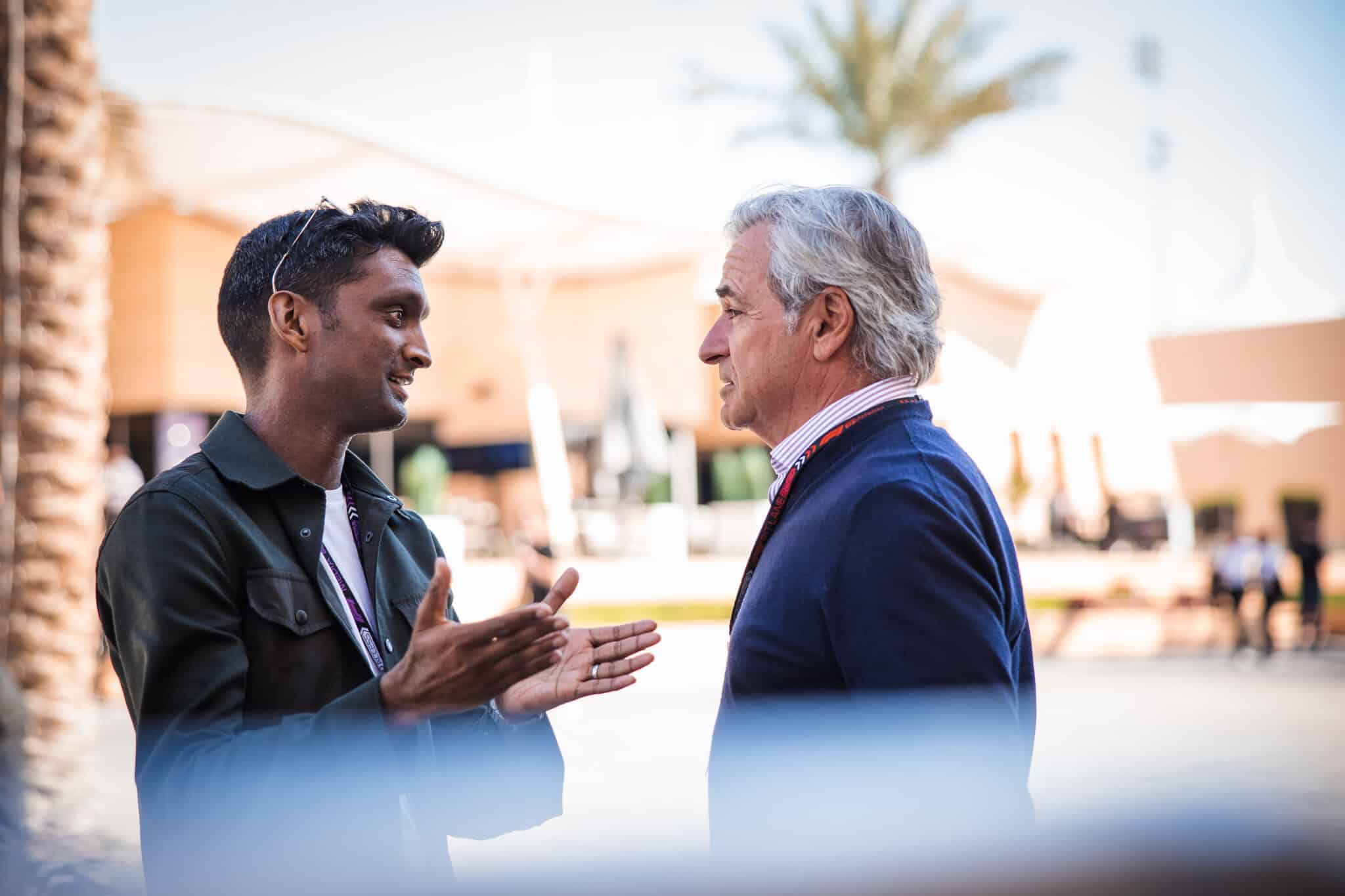
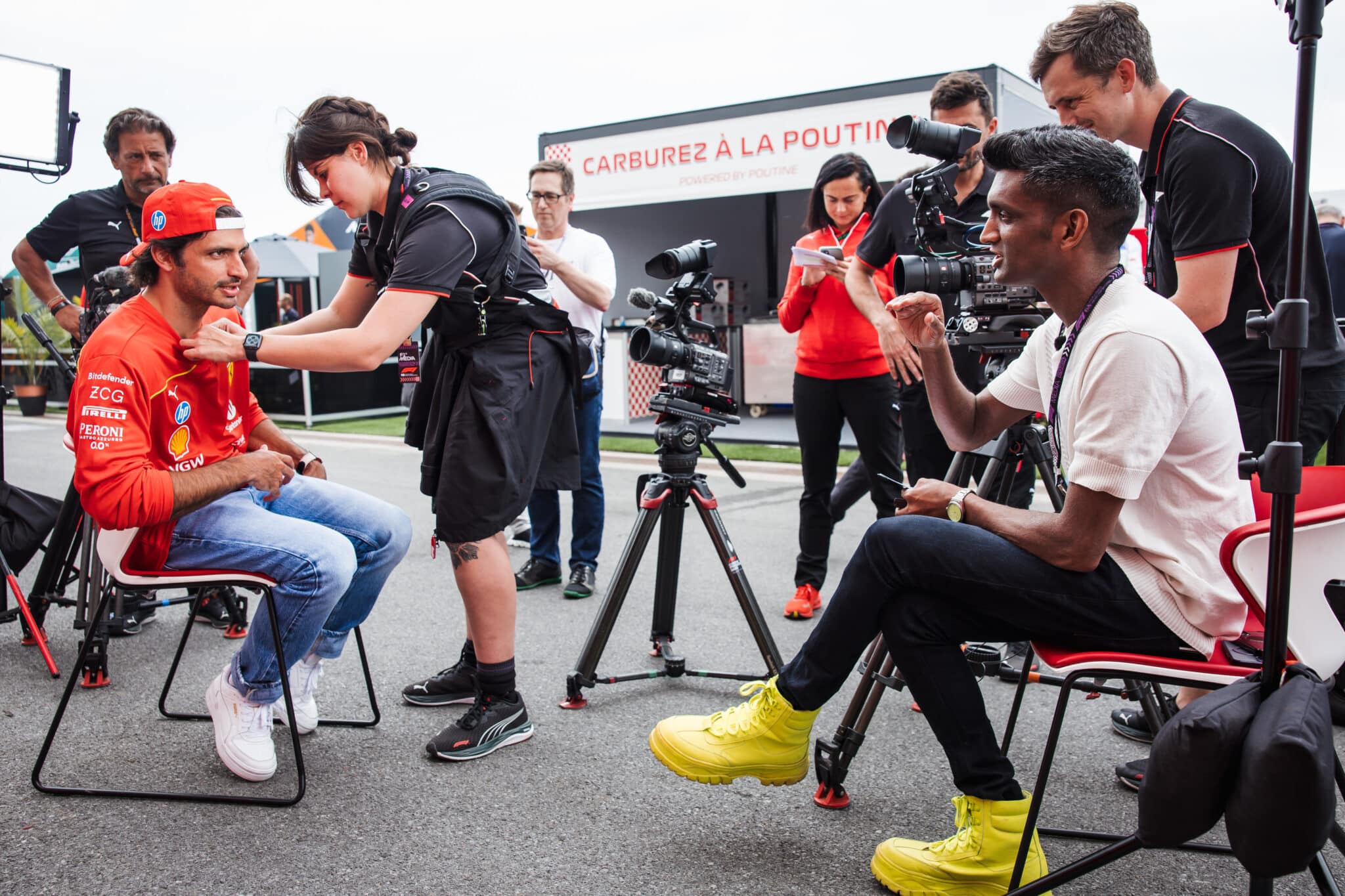
INSIGHTS
Lawrence Barretto
Formula 1 Writer, Interviewer, & Broadcaster
“Ultimately, whether you’re working for a team, a publication or for the sport itself, fundamentally they just want good people who understand the sport. “
Lawrence Barretto is a writer, interviewer and broadcaster covering Formula 1. This is his 10th full season travelling to the races, now working full-time for Formula One Management as chief correspondent and part-time as a reporter for Channel 4’s Formula 1 coverage.
He has a specialist focus on analysis, feature-length interviews, explainer features and opinion pieces. In broadcasting, he specialises in long-form interviews and acting as an analyst/pundit and editorial commentator.
Previously, he was the F1 correspondent for motorsport’s industry leading publication Autosport, covered the London 2012 Olympics, Wimbledon and Formula 1 for BBC Sport’s digital channels and Formula 1 feature writer for weekly-publication Sport Magazine. He is known for his quirky shoe collection, love of burgers and obsession with squash!
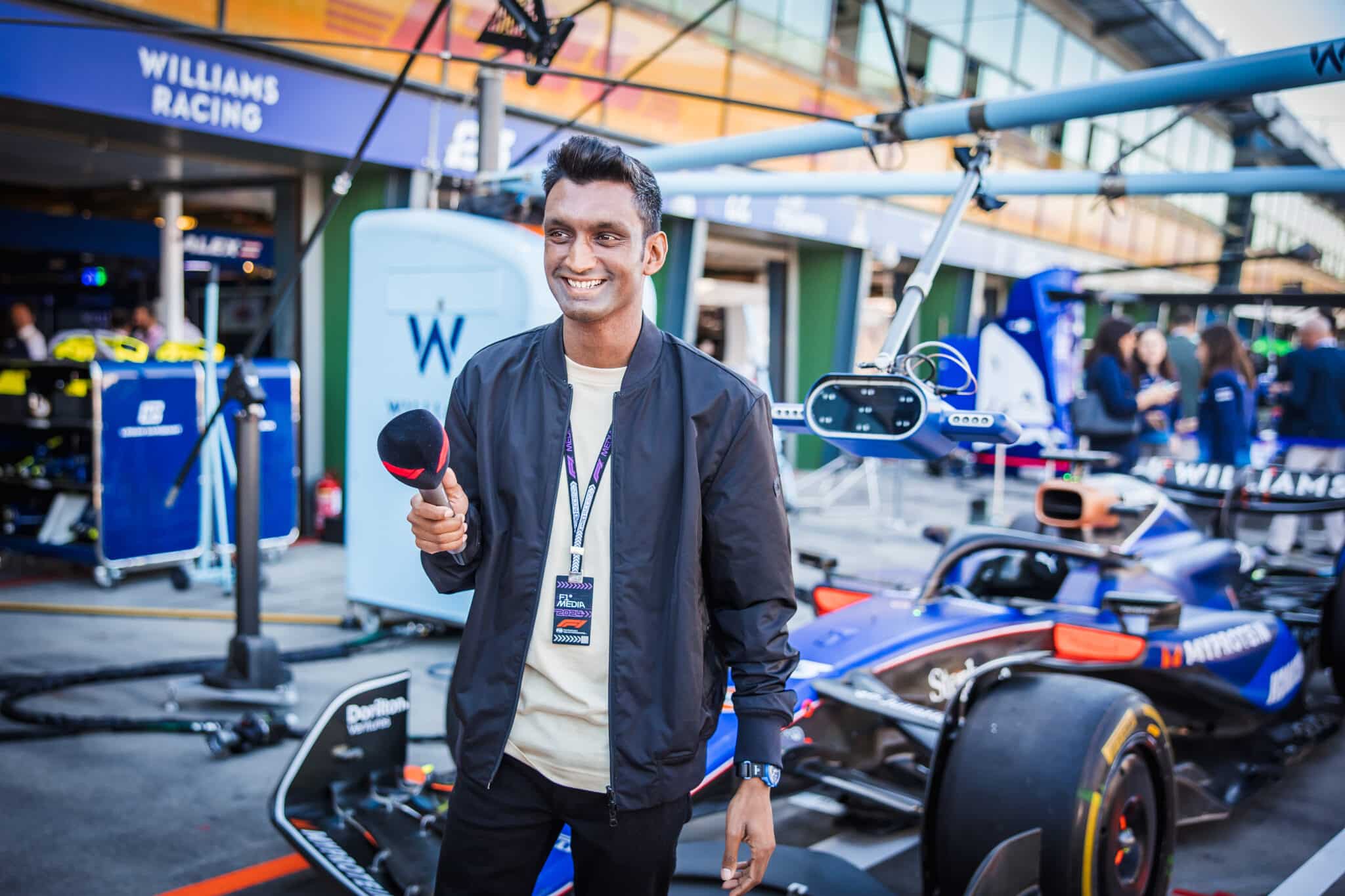
Where it all began
I got into Formula 1 through my dad. We watched the 1994 Australian Grand Prix in Adelaide and I was fascinated by the cars on the telly, the colours, the sounds, the crashes, the speed. After that, my dad took me to a British Touring Car race in Silverstone and my interest continued to build from there. I decided then, when I was eight, that I wanted to work in motorsport.
At first, I wanted to be a racing driver and dad sent me go karting. I quickly realised I wasn’t very good, despite all my mates saying I was “jockey weight” which would help me drive. I didn’t have the bottle to break as late as F1 drivers do.
But I was good at essay writing at school so my teacher said I should pursue something with writing. That’s when I thought I’d try and become a journalist in Formula 1. A lot of my career advisors said: “you should pick something that’s a bit more realistic” but it made me want to do this job even more because of that.
While studying at university, I participated in the Bridgestone e-reporter competition – which sadly doesn’t exist anymore – and was one of 10 writers from around Europe who were picked to attend a GP race and report on it. I got to go to Hungary which is where I met Lewis Hamilton and interviewed him for the first time. I even got some photos with him. Years later, I showed Lewis those photos and he remembered our chat, sat on cabinets at the back of the team garage. I think that helped build my relationship with him now almost 20 years later.
My position in 10 words or less
Presenter for F1.TV and Channel 4. Lead writer for F1.com.
Why what I do is important
When I was younger, and I wanted to work in Formula 1, what I really wanted was information; to know what was going on in the sport, what happened behind the scenes, know the inside story. I aspired to be the people who had that insight, who travelled to the races, made relationships with drivers, engineers, teams, and spent night and day trying to find information to break news stories.
Now, I try to do the same thing in my job. I know not everyone is lucky enough to travel the world or get to talk to drivers every single race weekend, so the best thing I can do is try and bring people closer to that. Whether it’s telling an interesting anecdote that I heard from one of the drivers or breaking a news story – the fans can feel like they’re part of it and can talk about Formula 1 with authority and a passion that will hopefully get more people excited about a sport I love. It’s not working in a medical field, but it’s something that I hope makes people’s lives a little bit happier.

My first race
The first time I went to an F1 race was the 1997 British Grand Prix. I went with my dad and my best friend. The first Grand Prix I covered properly was the 2005 British Grand Prix.
My most challenging moment
It was interviewing Former Chief Executive of the Formula One Group, Bernie Ecclestone, for the first time. He was an impressive character because he’d built Formula 1 out of nothing, but I was pretty intimidated by him as an outsider, because he always gave interviewers a really hard time.
Someone gave me his number when I was at university, and I wasn’t sure if it was the right number or if he was even going to pick up the call. In fact, I was pretty certain he wasn’t going to but I thought: “What’s the worst that could happen? He doesn’t know me. If I ring and it goes badly, it doesn’t really matter”. The phone barely rang when he answered. I prepped a lot of interview questions because I’d read interviews and seen him on the telly and he’d give really short answers. He saw dealing with the media as a game and wanted to catch them out and put them under pressure.
When I look back on it now, I think he was probably just impressed that I had the bottle to call him, that I’d managed to source his number, and I don’t think I asked him any silly questions because I genuinely believe he’d have hung up on me if I did. When I’d finished the interview, he said to me: “If there’s anything else, give me a call”.
Not only was it one of the first interviews I ever did, but I felt I was under lots of pressure to make it work. If I nailed it, I knew he would be a really good contact to have when I made it into Formula 1.
Bernie remembered me when I first met him in the paddock years later, which I thought was pretty cool and he gave me a lot of time. Bernie didn’t always give you time if he didn’t think it was worth it, so I found that pretty motivational going forward. I was always scared to talk to him, but I didn’t ever feel like I couldn’t talk to him.
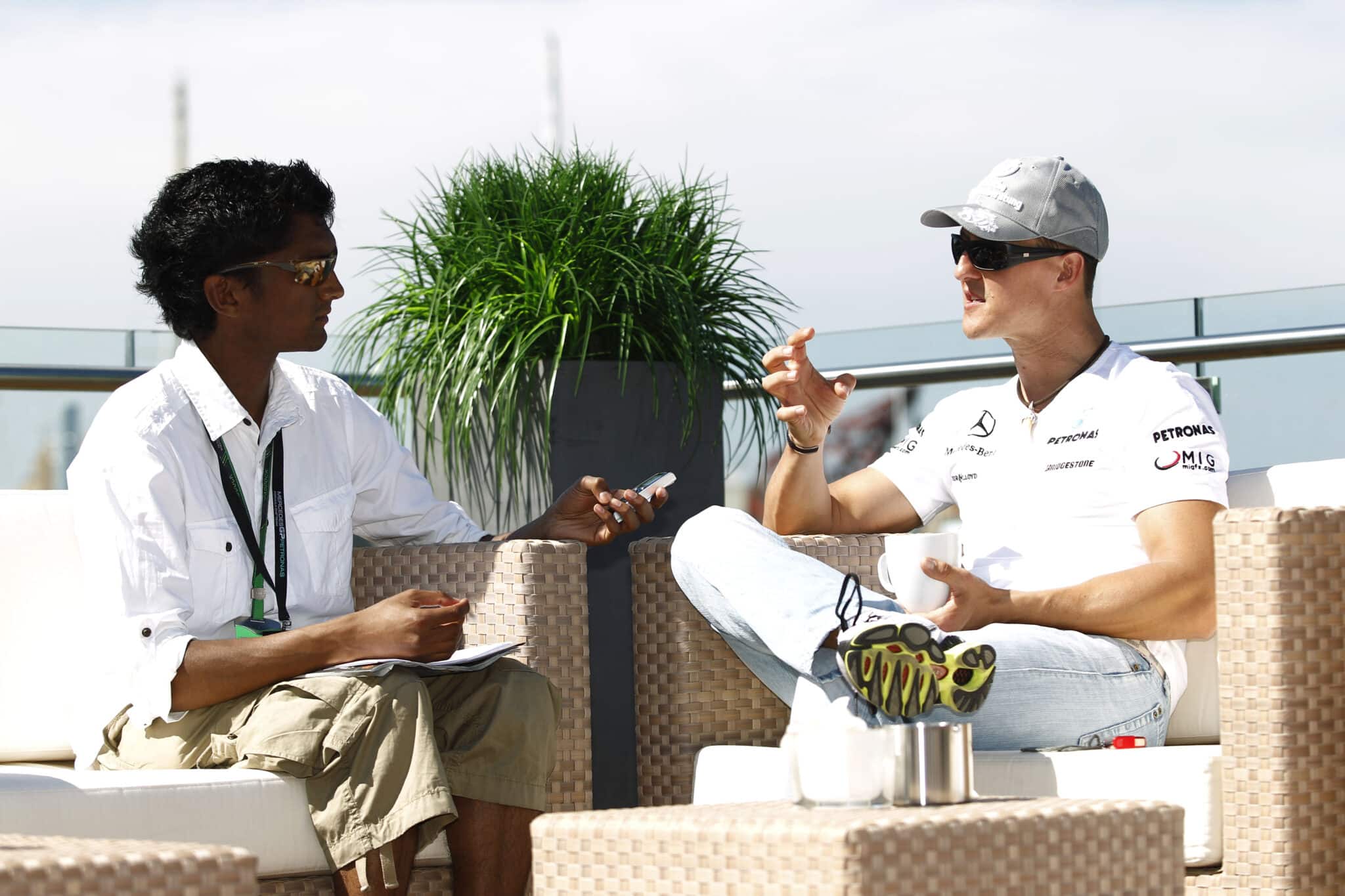
My proudest moment
My proudest moment is interviewing Michael Schumacher for the first time back in 2012. He was at Mercedes so he wasn’t having the best of times in his Formula 1 career. He was my hero growing up, so it was a proud moment because I always wanted to meet him as a child. But when I did, I didn’t want it to be disappointing and hoped he’d live up to the legend that he had built himself up to be.
It was my first working trip abroad so it was already a big deal for me, but I’ll never forget how he greeted me, asking questions about me like: why I was doing this job, what my long-term goals were and how I was going to get there. He even made me a good cup of tea before we started the interview.
After our chat and him making my tea, I was worried because we had less than half of our scheduled interview time. But he told me not to worry about it. Once we started, he did this thing where every time his PR person would come up, he’d shake his head so they’d go back while we continued to chat. I found it so fascinating how he had control over his own time. I think the interview went on for at least an hour.
When he finished Michael asked me what I was doing for the rest of the day and when I told him I was going for a run, he sat back down talked about running for another 15 minutes. He even gave me advice on how fix my knee injury.
I don’t know whether it was just that I caught him at the right time, or that the interview topics were good, but he was absolutely the hero and legend that I thought he’d be and came across as the most inspiring person that I’ve ever met.
I didn’t see him for another year and a half but one day we bumped into each other at the airport and he came up to me he asked me how my knee was!
An F1 memory I’ll never forget
One that stands out is the 2021 Italian Grand Prix in Monza where Daniel Ricciardo won for McLaren. It was the first win that McLaren had for a decade. Ricciardo was having a really awful time at McLaren because he just couldn’t get the form he had at Red Bull. He was getting down and there was all sorts of speculation about his future. Then he went and won that Grand Prix out of nowhere!
One of the real joys of my job is speaking to drivers when they are elated and as fresh out of the car as we’re ever going to get them. They come straight to us after standing on the podium so they’re still buzzing. That day, I was the last slot in the TV pen that Daniel came to, and he was still buzzing, still smiling, and super happy.
He did this really insightful interview into his mindset going through that race, and what it meant for him to finally win that Grand Prix after all the tough times he’d had. Then I took my shoe off and filled it with beer and said: “Let’s do a shoey” and he loved it. His eyes lit up. I wasn’t sure if he was going to do it, but the shoe had already been filled with beer and I’d lost a shoe – and shoes are very important to me!
After he did it, I said if he won another race – which he hasn’t yet – I would do one in return. I’ve got the other shoe ready to go which I take around the world with me.
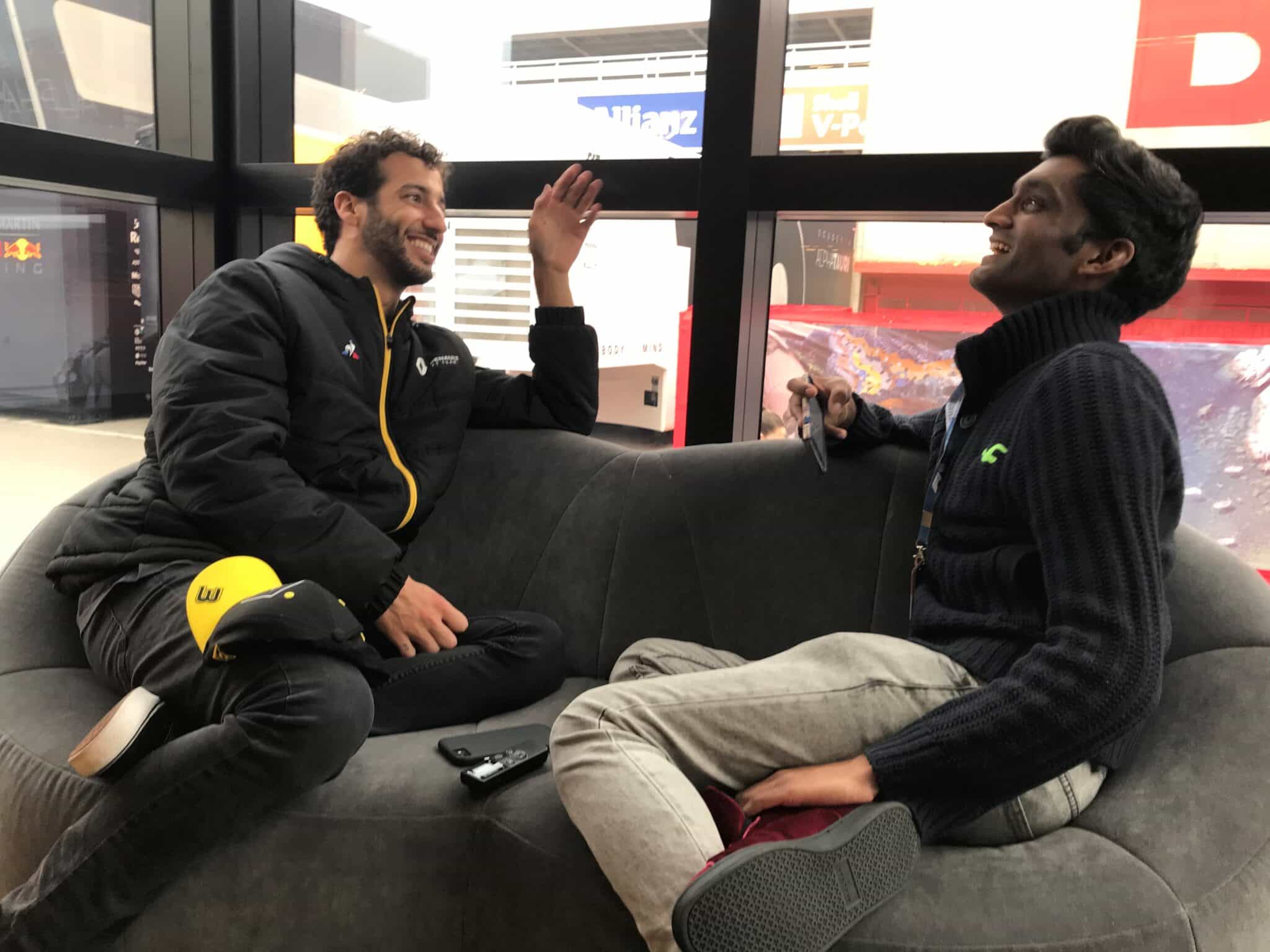
How I’ve worked with SMG
What I like about working in Formula 1 is that you get to work with a great deal of people, many of whom will ultimately become your friends. One of those people is Tom Cooney at SMG. I’ve known him for more than 10 years, and we have worked together on a huge range of projects, including some in Austin, Hungary, and Azerbaijan.
What I really enjoy about building those relationships and working with the SMG team is that you can trust them to always pick up the phone when you need something, always give you information that you need, and can enjoy working with them. When I want to learn more about a Grand Prix and get the most out of an event, it’s so great to be engaged with a firm who understands Formula 1 as well as SMG, and who can bring the event to life for me. Some of the best and the most fun things I’ve done in F1 were through SMG.
My advice to others wanting to get a career in motorsports
Go to uni. Do loads of work experience. Get good experience. Give it a go!
Formula 1 is an incredible sport and so it is well worth your time trying to do everything that you can to find a way in. It is definitely not an easy task but once you are in and you’ve proven that you’ve got the skills to succeed, you can get so much out of it.
Learn everything you can about the sport. Fully understand what you can from the outside. Understand that it is just as much about the racing on track, as it is about what happens off track. It’s about the personalities and the drivers, the politics, the business. Try and get a feeling for why it is different to any other sport in the world. And then just go and get experience. Whether it is within the media, whether it is in communications or marketing, whether you want to be an engineer, or a driver, go and be the best of what you can in that field before coming into Formula 1.
Talk to people because some of the people I met at my first race, I still know today. They’ve become friends, or mentors almost, and if you keep in contact with those people and you meet the right people and ask the right questions, and prove to them that you’re good enough, you’ll find your way in.
Ultimately, whether you’re working for a team, a publication or for the sport itself, fundamentally they just want good people who understand the sport. There are quite a few schemes to look out for, like engineering scholarships, or teams who run an academy. For the first time, teams are actively looking for good workers. Make sure you can present yourself as the best in that field with the experience you can get – whether that is in a different sport or in a different field – and just keep asking and knocking on the doors.
